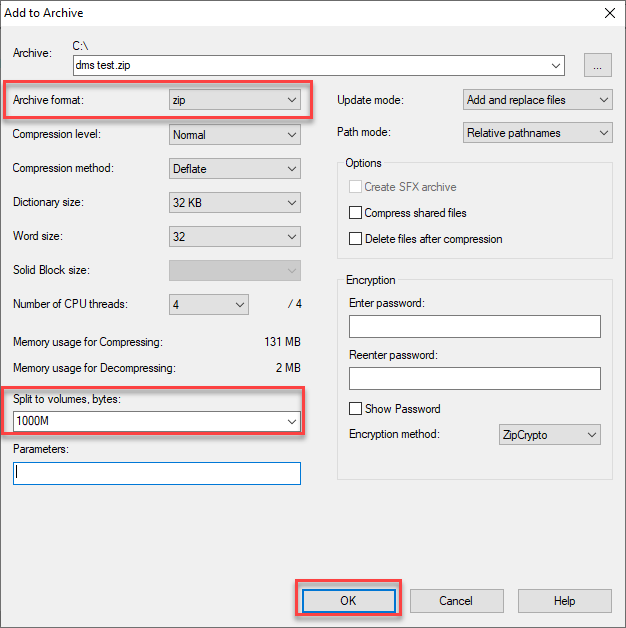ProSeries Professional Intuit Hosting onboarding and setup guide
by Intuit•3• Updated 2 days ago
It's important to note that this article applies to ProSeries Professional only, and not ProSeries Basic . If you will be using both in the hosted environment, follow the automation steps in the ProSeries Professional guide, before moving your ProSeries Basic files using the steps in this article.
Table of contents:
For more Print & PDF resources, check out our Troubleshooting page for Print & PDF where you'll find answers to the most commonly asked questions.
Additional guides are available for setting up some additional products in the hosted environment:
- Document Management System (DMS)
- Microsoft Office
- EasyAcct Professional and Information Return System (IRS)
- SmartVault
- SurePrep
Scheduling your onboarding appointment
When you purchase Intuit Hosting online, your Order Summary will have a Schedule appointment button. This will allow you to select a date and time that works best for you to have one of our onboarding experts help you move your ProSeries Professional information into Rightworks.
When you purchase through sales, they'll assist you with scheduling your onboarding appointment.
If you have an appointment scheduled, see Steps to complete before your Intuit Hosting onboarding appointment.

Activating your Rightworks account
- From the welcome email, select Activate Your Account.
- Create your Rightworks password.
- Sign in to the Rightworks AppHub with your email address and your newly created password.
- You will be prompted to enter a phone number, the Area Code in a separate field than the remainder of the Phone Number (without dashes or spaces). Then select Next.
- Enter a 4-digit number of your choice in the Create a Support PIN field. Select Next.
- Answer the question on if you will be using the hosted environment.
- Select the Intuit ProSeries Tax package to assign to yourself, if applicable. Then select Next.
- You will be prompted to install TSPrint and TSScan which are go-betweens for printing and scanning. This can be done at this time or skipped for now if needed. Select Next when ready.
- You will be prompted to agree to terms to finish setting up your login.

Adding users and assigning packages
- Sign in to the Rightworks AppHub.
- Go to the Admin Controls.
- Select the Users tab.
- Choose the Add User button.
- Select a role for the new user from the Role dropdown list:
- User (catalog) lets users install apps for themselves.
- User (no catalog) doesn't let users install apps for themselves.
- Account Admin is similar to the Account Owner role. These users can add/remove users, assign/unassign packages and add-ons, send password reset emails to users, and install apps for themselves and other users.
- Information about the other listed roles can be seen by hovering over the ?.
- Enter the new user's First Name, Last Name, and Email Address, and then select Next.
- The email address entered can't already be in use in Rightworks.
- Highlight the Intuit ProSeries Tax box to assign one of the packages to the new user and select Next.
- If you want the user to only have access to the Rightworks AppHub, you can select Next without assigning a package.
- Make sure the new user's information is correct on the Add User - Review Details pop-up screen.
- Select Add User.

Setting up access from your computer
For instructions on setting up access from a Mac, see this article.
Select the Setup Your Computer link on the upper right of your Rightworks AppHub My Apps screen, then select the Download PC Wizard button in the pop-up to download the wizard.
The wizard can be run on multiple computers and set to use the same login. Only one computer can access the hosted environment at the same time with the same login. For example if you leave your home computer signed in to the hosted environment and go to your office and use it to access hosted, the home computer will be kicked off.
- Run the downloaded RightNetworksSetupWizard.exe.
- Select Just set up your computer.
- Enter the email address that is your Rightworks username and the password you created.
- If you receive an error about not having permission to sign in or an "object reference not set to an instance of an object" error message, check the Rightworks AppHub and make sure you have an Intuit ProSeries Tax package assigned to the email address being used.
- The wizard will then install TSPrint and TSScan (used for printing and scanning). When you receive the Installation Successful! message, select Next.
- Windows may ask if you want to allow the wizard to make changes at this point and later while running this wizard, select Yes if prompted.
- The wizard will then add a Rightworks shortcut to your desktop and a shortcut to the Rightworks AppHub. You may uncheck the Add AppHub Shortcut checkbox, if desired. Select Next.
- When you see the You're Done! message from the Setup Wizard, select Finish to close it.
In rare cases, you may not be able to run the setup wizard. Usually this is due to local system configuration.

If the wizard didn't work, see the manual instructions here
Manually setting up scanning
- On the TerminalWorks TSScan download page, make sure Windows EXE (200,XP,Vista,7,8,10,11) is selected from the Client dropdown.
- Choose Download Client.
- Run the downloaded TSScan_client.exe file.
Manually creating a shortcut to access the hosted environment
- In the Windows search box in the taskbar, type mstsc.exe and select the Remote Desktop Connection app.
- Go to the Advanced tab.
- If you don't see tabs, select Show Options in the lower left.
- From the If server authentication fails dropdown list choose Connect and don't warn me.
- If you are unable to see the Advanced tab select Show Options in the lower left.
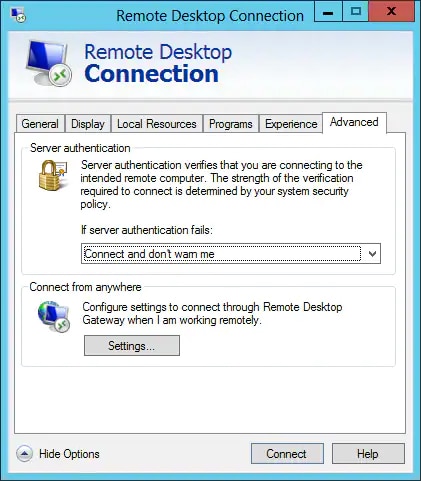
- If you are unable to see the Advanced tab select Show Options in the lower left.
- Go to the Experience tab.
- Select LAN (10 Mbps or higher) from the Choose your connection speed to optimize performance dropdown.
- If you have an especially slow internet connection, you may set this lower to improve the experience.
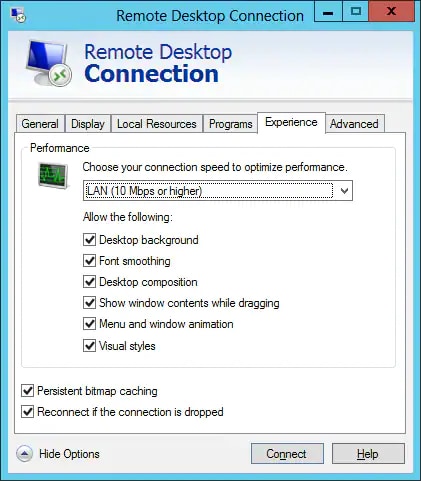
- If you have an especially slow internet connection, you may set this lower to improve the experience.
- Go to the Local Resources tab.
- Uncheck the Printers checkbox under the Local devices and resources section.
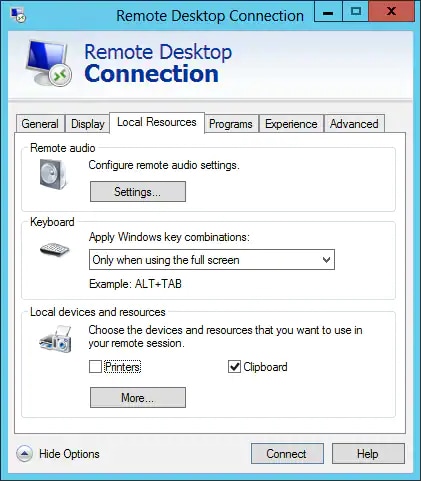
- Go to the General tab and enter your login address in the Computer field.
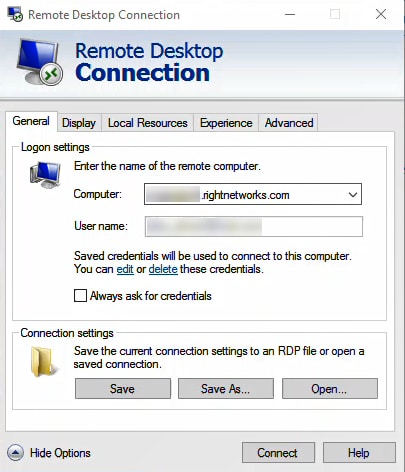
- If you don't have your login address, call for assistance.
For more information on how to contact ProSeries, as well as our operating hours, click here.


Installing Apps
- The package assigned to a user (and add-ons, if any) control what's available to install for them.
- The Account Owner, and users with the role of Account Admin, can install apps for any users that have been assigned a package. They will need to install apps for users with the User (no catalog) role.
- Users with the User (catalog) role that have been assigned a package can install apps for themselves and will be taken directly to My Apps when they sign in to the portal.
- Install ProSeries for the user who should be the ProSeries admin first.
- The 10 most recent years of ProSeries, multiple years of Fixed Asset Manager, and the current version of ProSeries Document Management System are available to install when a ProSeries package is assigned to a user.
- Sign in to the Rightworks AppHub.
- Select My Apps in the left column.
- Users with the User (no catalog) role will need the Account Owner or an Account Admin to install apps for them.
- If you are the Account Owner or an Account Admin and you want to install for a user instead:
- Go to Admin Controls ⮕ Users and select the name (or email address) for the user. This will take you to their apps page instead.
- Go to the Cloud Apps tab.
- Additional apps are available on the Manual Install Apps tab that can take up to 3 business days before becoming available (the Rightworks Provisioning Team may email asking for additional information needed).
- In the Available Applications section, choose Install for all desired programs.
- If you have more than one user, remember to install ProSeries Professional for the user who should be the ProSeries admin first.
- Once an app has been installed, you'll see it in the Installed Applications section.

Onboarding automation
Before uploading your data using automation, check the space you have available on your C:\ drive. ProSeries will need enough space to temporarily copy the files you'll be uploading. You can have the automation tool upload one year, then run it again to upload a different year if needed. You can check your disk space in File Explorer by selecting This PC on the left. The available space will appear under Devices and drives.
Alternative steps (if ProSeries is not installed locally)
- This article references default installation paths and uses YY to reference the tax year in 20YY format. C: will always indicate the local drive and X: will always indicate the network drive.
Manually backing up your client data and options
- On your desktop computer, browse to your data folder.
- For ProSeries Standalone Installations, this is usually in C:\ProWinYY.
- For ProSeries Network Installations, this is usually in X:\ProNetYY.
- Using Ctrl+click, highlight both the YYData folder and the Common folder.
- For Network versions year 2018 and newer the masterinventory.dat file can also be highlighted to include in the zip.
- Right-click on the YYData folder.
- Go to Send To and choose Compressed (zipped) folder.
- This will make a copy of the two folders into a zipped file giving it the name YYData.
- Repeat this process for each tax year you want to move into the hosted environment.
Uploading your backups
- Sign in to the Rightworks File Manager locally, outside the hosted environment.
- The I:\ drive is selected by default in the left column.
- Select the blue Upload button.

- The Upload Files pop-up has a Drag and drop files here area available for use.
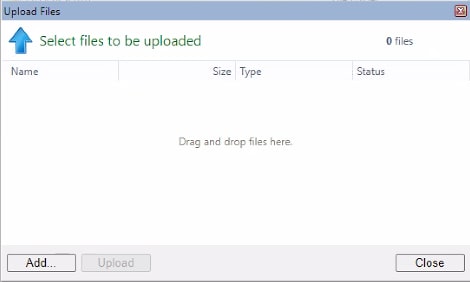
- If you won't be dragging and dropping, for each year you'll be uploading, you'll need to:
- Click the Add... button.
- Browse to where the zipped file was created.
- Highlight the zipped file and click Open.
- Select Upload to begin copying the data to the hosted environment.
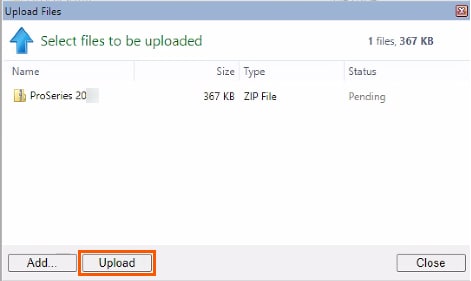
Unzipping the uploaded folders
Once the zips have finished uploading to the hosted environment, they need to be extracted.
- Open the Rightworks remote desktop using the hosted environment shortcut.

- Open File Explorer and browse to your I:\ drive.
- Highlight an uploaded zipped folder.
- Select the Compressed Folder Tools Extract tab that appears.
- Select Extract all.
- The Files will be extracted to this folder field will default to the I:\ drive in a folder that would be created using the same name as the zip. Select Extract.
- Repeat the extraction process for each year uploaded.
Placing your options
- Copy the extracted common folder.
- You can use Ctrl+C (keyboard shortcuts work by default in the hosted environment when it's maximized) or select the Home tab in File Explorer and use the Copy button.
- Browse to I:\ProSeries20YY\ProNetYY.
- Paste the common folder.
- You can use Ctrl+V or select the Home tab in File Explorer and use the Paste button.
- You'll get a message that the destination has files with the same names. Select Replace the files in the destination.
Placing masterinventory.dat (if applicable 2018 and newer)
- Copy the masterinventory.dat file.
- You can use Ctrl+C (keyboard shortcuts work by default in the hosted environment when it's maximized) or select the Home tab in File Explorer and use the Copy button.
- Browse to the appropriate location for that year's file: I:\ProSeries20YY\ProNetYY.
- Paste the masterinventory.dat file.
- You can use Ctrl+V or select the Home tab in File Explorer and use the Paste button.
- If there is already a masterinventory.dat file present you'll get a message that the destination has files with the same names. Select Replace the file in the destination.
Placing your data
- Copy the extracted data folder.
- You can use Ctrl+C (keyboard shortcuts work by default in the hosted environment when it's maximized) or select the Home tab in File Explorer and use the Copy button.
- Browse to I:\ProSeries20YY\ProNetYY.
- Paste the data folder.
- You can use Ctrl+V or select the Home tab in File Explorer and use the Paste button.
When you open ProSeries Professionalafter putting your data folder in place, tax years 2019 and newer will normally automatically add those clients to your HomeBase view. Older years will not. You can still open clients from the File menu by going to Open Client and browsing to I:\ProSeries20YY\ProNetYY\YYData. Saving a client will usually add them to your HomeBase view in these older years (and in newer years if they did not automatically get added).

Uploading your data to Rightworks
- Open 2025 ProSeries locally.
- Close all other years of ProSeries.
- Ask all other ProSeries users at your firm to close all years that you will be uploading.
- From the Tools menu, select Intuit Hosting for ProSeries Tax (Rightworks) and choose Copy Data Files to Hosting (data transfer).
- After reviewing the notice, select Confirm.
- Enter your Rightworks Username and Password, and then select Sign In.
- On the Select Files screen, check the programs whose data you'd like uploaded to Right Networks.
- Select the Show more files link to see additional options.
- After you've made your selections, select Upload.
- If you experience an interruption in your internet service, the upload will resume once the connection is re-established.

Importing your data in Rightworks
- Access the hosted environment using the shortcut on your local desktop that you created earlier.

- Open the 2025 ProSeries program in Rightworks.
- Do not open other years of ProSeries or DMS until the files have completed importing.
- Enter your Customer Account Number and Zip Code when prompted and follow the licensing prompts.
- Sign in to ProSeries.
- From the Tools menu, go to Intuit Hosting for ProSeries Tax (Rightworks) and select Import files into Hosting.
- The File Selection screen will automatically detect all applications that were uploaded earlier. Make sure that this is accurate, and then select Start Import.
- After the import completes, select Close.
- There will be a Hosting folder on your I:\ drive. It contains logs of the import and a backup of the files that automation put in place.

Completing your program setup
Installing additional tax types and states
In the hosted environment, the 1040, 1120, 1120S, and 1065 Federal Products get installed to start. ProSeries is slow when everything is installed, so you'll want to install what you need for your client files. Automation brings the list of what you installed, but you'll need to repair or refresh updates.
- Open ProSeries.
- It is best to run the Repair Updates Tool from the ProSeries Tools folder on the Hosted Desktop for each year after choosing the States. This will ensure all states are properly installed.
- From the Update menu, choose Select and Download New Products.
- Be sure to check the desired Federal Products in the lower left in addition to checking the needed State Products.
- If you have more than one computer monitor, you may find it helpful to open the same year of ProSeries locally on your other monitor and navigate to this screen so you can compare it with what you installed locally.
- Click Next.
- Click Install Now when the Ready to Install screen appears.
- It is recommended to run the Repair Updates Tool from the ProSeries Tools folder on the Hosted Desktop for each year of ProSeries Basic after selecting the States. This will ensure all states are properly installed.

Licensing ProSeries
You may be automatically prompted to license ProSeries.
To manually license ProSeries:
From the Tools menu, select License Products.

Updating your e-file acknowledgements
When you move your files over, e-file acknowledgements may need to be redownloaded.
This option is available for the current tax year, and the two prior tax years, while the IRS Modernized e-File Status (MeF) is open.
- Go to the EF Center HomeBase view.
- Select the returns.
- From the E-file menu, select Electronic Filing.
- Select Update Acknowledgement Status of Selected Returns/Extensions/Payments.
- Choose to update Only the selected return.
- Select OK to retrieve the latest available status.

ProSeries Fixed Asset Manager (FAM)
Locating and zipping your FAM clients:
- On your desktop computer, browse to your Clients folder and confirm there are files inside.
- When saved on the C:\ drive this is normally C:\FamWinYY\Clients.
- To locate the FAM clients when they aren't in the above location:
- Open Fixed Asset Manager.
- From the Tools menu select Program Options.
- Select the Clients tab.
- Under File Locations make note of the Default Client Location.
- Browse to this location and confirm there are files inside.
- Right-click on the Clients folder.
- Go to Send To and choose Compressed (zipped) folder.
- If you are planning on uploading multiple years of FAM, rename the zip to YYFAM indicating the year.
Unzipping and putting FAM clients in place:
- Open the Rightworks hosted environment using your shortcut.

- Open File Explorer and browse to your I:\ drive.
- Highlight an uploaded zipped folder.
- Select the Compressed Folder Tools Extract tab that appears.
- Click on the Extract all button.
- The Files will be extracted to this folder field will default to the I:\ drive in a folder that would be created using the same name as the zip. Click Extract.
- Repeat the extraction process for each year's FAM clients that were uploaded.
- Browse to the extracted Clients folder and open it.
- Select all.
- You can use Ctrl+A (keyboard shortcuts work by default in the hosted environment when it's maximized) or select the Home tab in File Explorer and use the Select all button.
- Copy.
- You can use Ctrl+C or select the Home tab in File Explorer and use the Copy button.
- Browse to I:\FamWinYY\Clients.
- Paste the contents of the Clients folder.
- You can use Ctrl+V or select the Home tab in File Explorer and use the Paste button.

Uploading other data into the hosted environment
How do I move files between the hosted and local environments?
- When you need to move file(s) from, or to, the hosted environment, smaller files can be copied and pasted.
- By default, keyboard shortcuts work in the hosted environment when it's maximized.
- Ctrl+C and Ctrl+V are the copy and paste shortcuts. Alternatively, there are buttons in the Home menu in File Explorer for these functions.
- Use the Rightworks File Manager site from the local computer to upload or download files when multiple files or larger files are being moved.
- If the site is failing with a 404 error, clear cache and cookies and restart the browser, try in a different browser, or use an incognito window.
- Make sure a wired internet connection is being used to better avoid timeouts due to problems with the internet connection.


